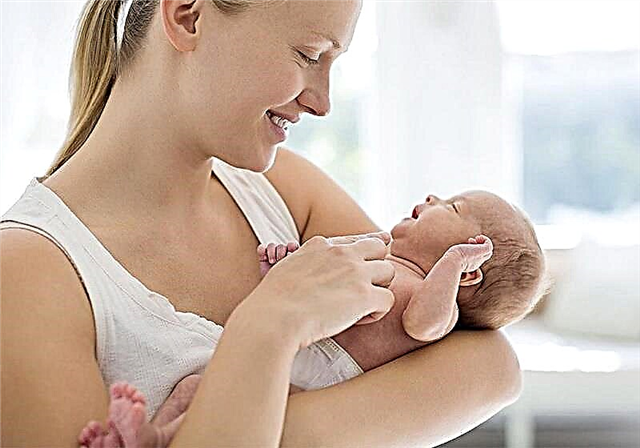
Calm mom, joyful dad, children with happy faces ... Such an image of a family is usually presented to us by advertising posters, billboards, photos on the Internet and in magazines. But is the life of the family so ideal, where the second (third, etc.) child appeared? The older baby is not always happy with the birth of a younger brother or sister. He doesn't want to share the love and care of his parents with anyone else. He becomes jealous, and this childish jealousy is destructive in an adult way. Everyone suffers - both the parents and the little jealous person himself.

This problem is not far-fetched, it concerns most families with children. What if this happens to you? Can childhood jealousy be prevented and how to achieve it?
Sibling rivalry
Jealousy is an extremely destructive feeling, and childhood jealousy is doubly destructive.
Most often she appears in children who are not yet 5 years old. The kid is used to being in the center of attention, he sincerely believes that he is the most important in the family, and therefore the appearance of a newborn, around whom the whole life of the parents immediately begins to revolve, painfully hits the first child in the most vulnerable place. He stops feeling safe. The child develops fears.
Shouting and crying, as well as deliberately bad behavior, he tries to protect his personal space and express his protest.
The manifestations of jealousy at the birth of a second and subsequent children in an older baby can manifest themselves in the form of frequent whims, aggression directed at the newborn and at adults. In the first child, the level of anxiety increases, and appetite and sleep disorders can be recorded. Some especially impressionable children become withdrawn. Less often - older children "fall into childhood", regress, begin to lisp and ask for a pacifier, rattles, or even start peeing in their pants again.

How to reduce the risk of childhood jealousy?
- When planning a second child, listen to the wishes of your first child. It is optimal if he also wants to be replenished in the family and will wait for a brother or sister with you. A conscious desire to take care of someone else in children appears by the age of 4-5. It is for this reason that experts do not advise giving birth to a second child earlier than this. Optimal for the full acceptance of the "youngest" is the age of 5-6 years. However, even a sincere desire for the first child to have a brother or sister does not guarantee a complete absence of jealousy. It can develop unexpectedly.
- The first child must be involved in all matters related to the imminent birth of a baby. Let him participate on an equal footing in the choice of baby things for the newborn, in the purchase of a stroller, in the collection of a crib. Expectation with parents greatly reduces the likelihood of jealousy in the child.

- When the second child is born, there is no need to forbid the elder to take him in his arms (strictly under your control!), To take care of the baby. An older child can provide quite significant help to a mother - supply diapers, diapers and powder, swing the baby in a stroller. Don't underestimate the capabilities of the firstborn! But you don't need to abuse them either.
- Don't turn an older child into a nanny for the younger! Of course, the mother gets tired, she needs help, but it is stupid and selfish to force the child to abandon his own interests and affairs in order to make life easier for his parents. Accept help from the firstborn only when he himself expresses a desire to provide it. Forcing the elder to follow the younger is a sure way to develop childish jealousy.
- Always, every day, regardless of the weather, employment, well-being, find at least 1 hour in order to spend it alone with an older child. This could be walking, watching a movie, drawing, or reading. Most importantly, do it together!

- In your family, as in the judicial system of Russia, the "presumption of innocence" must be strictly observed. In other words, mom and dad need to be objective and fair in relation to all children equally. Any bias or relaxation in favor of one and toughening of measures in relation to the other will immediately cause an outbreak of childish jealousy, which will then be difficult to extinguish.
- Do not rush to enroll the elder as an adult! Often we say to the first-born after the birth of the second child: “You are now an adult! You are the elder, and therefore you must ... ". Answer yourself honestly, with what, in fact, was the joy of yesterday's toddler suddenly became an adult so sharply? And why did he suddenly owe something to someone? He remained the same, an ordinary child. Don't change your attitude towards him!

Typical situations are analyzed in more detail in the next program, where an experienced psychologist Natalia Kholodenko gives recommendations to parents.
Parent reaction
No matter how prepared mom and dad for possible manifestations of child jealousy, she usually takes adults by surprise. And they are not always able to adequately respond. First of all, it is important to remember that you do not need to be afraid of childish jealousy, since it is quite natural for children and is an important component of his inner "I".
Boys are more susceptible to jealousy. Girls have a more developed instinct to take care of someone, they accept the youngest more quickly and require attention and affection less aggressively. Boys are jealous selflessly, heading into this process. The greatest risk of childhood jealousy is between same-sex children.
Don't punish an older child, even if jealousy has taken him far enough - he offends the younger one, takes away his toys. The punishment in this situation will, of course, be well deserved, but only complicate the situation.

The jealousy of the elder for the younger should not be denied or ignored.
It is best to have a heart-to-heart talk with the firstborn, tell him what he feels, but cannot express in words himself: what emotions he possesses, why it is difficult for him to accept the baby. Try to conclude some kind of agreement with the elder, according to which he will not harm the baby, and you undertake to pay more attention to the first child.
And remember that you cannot completely overcome childhood jealousy, but you can reduce it and reduce the number of its manifestations if you apply more love and care. And a child needs to learn to experience jealousy itself, and not to hide it, the ability to be jealous in a “civilized” manner will then be useful to him in adult life.

Psychologist's advice
It is necessary to prepare a little jealous person for the appearance of a brother or sister in advance. The sooner your child learns about the upcoming replenishment in the family, the better he will be able to adapt.
- You cannot force an older child to "love" a baby. Each feeling has its own time. Brotherly love will surely come, but it is not a fact that right now, and certainly not at the request of the parents.
- In no case children cannot be compared with each other! They are different. Accept this as a fait accompli and never stress the merits of one baby as a rebuke to the other.
- Tell your first child more often that mom loves him very much, and with the birth of the second child, nothing in this love has changed.
- Adopt the principle "Eight hugs". To feel loved and needed, a child needs a minimum of 8 hugs during the day.
- The most dangerous childhood jealousy is latent. Outwardly, you may not notice its manifestations, but the tension that will accumulate inside the child can cause diseases that are quite tangible at the physical level.

- Encourage sharing of toys between children if their age difference is small. Teach them to share. If siblings are fighting hard for the right to own a particular toy, declare that all toys in the house are now "Mom's". And give them to children at your discretion.
- Emphasize more often that the baby loves his older brother (sister) very much. Pay the attention of the first-born to what adoring look the little one looks at him with. You definitely won't have to exaggerate or deceive, because all kids really idolize their older brothers and sisters.
- If the child began to regress and demands to give him a breast, like the youngest, to take him on the arms, if he began to "encroach" on the baby's rattles, offer him a pacifier, wrap him in a diaper, while forbidding him to eat apples and cakes, because "little is not allowed." The elder will quickly realize that being a baby is extremely unprofitable and will "return to his age" back.
- It is not necessary to give the things of the older child to the younger if the “big” is against it. It is better to buy a new crib or stroller than to take away from a grown child. After all, for him it will be painful and very insulting. Things can only be inherited with the consent of the older child.

- Learn to share everything, absolutely everything, equally between the children. This also applies to sweets and your attention. If you kissed one baby, immediately kiss the other. If you took one in your arms, hug or sit on the lap of the second.
- Do not give the second toddler affectionate nicknames and names, which you called the eldest child in infancy. There can be only one “Karasik”, “Pukhlik” or “Bear Cub” in a family. The older child is not ready to give the baby his middle name. Pick up a new affectionate nickname for the second child. My three-year-old son was quite jealous of his newborn brother. It was possible to reconcile them, including with the help of affectionate names. The first one we always had was "Pie with Cabbage". We called the second one "Pie with jam". It kind of made the kids equal, and at the same time, everyone feels their own individuality.
- No matter how similar brothers and sisters are, remember that they are still different. Therefore, they need different sections, circles. If each child does something of his own, for which he has the ability and interest, then the rivalry between children can be minimized.
- Rarely, but there is also reverse jealousy - the younger child begins to be jealous of the mother for the older one. It is much easier to smooth out such jealousy, because most kids still perceive their older brothers and sisters as another parent.
In the following video, you will receive some more valuable tips for finding a compromise between children.
Correction of the behavior of "jealous"
Help the jealous you can cope with the surging feelings with the help of fairy tale therapy. It will be easier and more understandable for the child if you explain to him the essence of what is happening using the example of your favorite fairy-tale characters.
If jealousy begins from the first days after discharge from the hospital, the father can provide significant help. He is able to help cope with the newborn, and the mother will receive additional time to be alone with the first child. But to “shake off” the elder into grandparents is a pernicious practice. Placed in the care of an older generation, your first child will feel even more unhappy, abandoned and left out.
Role-playing games will also help to reduce the manifestations of childhood jealousy, in which the child will be asked to take care of someone weaker and try on the role of a teacher.
For example, well-known "mothers and daughters". My jealous and mischievous three-year-old was happy to play in the "clinic" and treat his plush company. And then I offered him to play doctor with his little brother, and allowed him to anoint his hands with baby cream or sprinkle powder on his ass.

Art therapy is a great help in correcting jealous behavior. Invite the elder to draw what he and his little brother (or sister) will become in the future. Let your imagination run wild and help your kid compose a fairy tale about these drawn characters. Emphasize that it helped them to overcome difficulties and troubles because the brothers were always together and helped each other out. Whenever you see a positive example of sibling, show those examples to the older child. He should form a stable understanding that the youngest child is not only consumers of mother's time and attention, but also an excellent company for him in the future and his best, closest friend for life.

The following video looks at common mistakes parents make when they have a second child.
Most often, parents are to blame for conflicts between children, when babies grow up to be almost enemies. See the next video for more on this.



